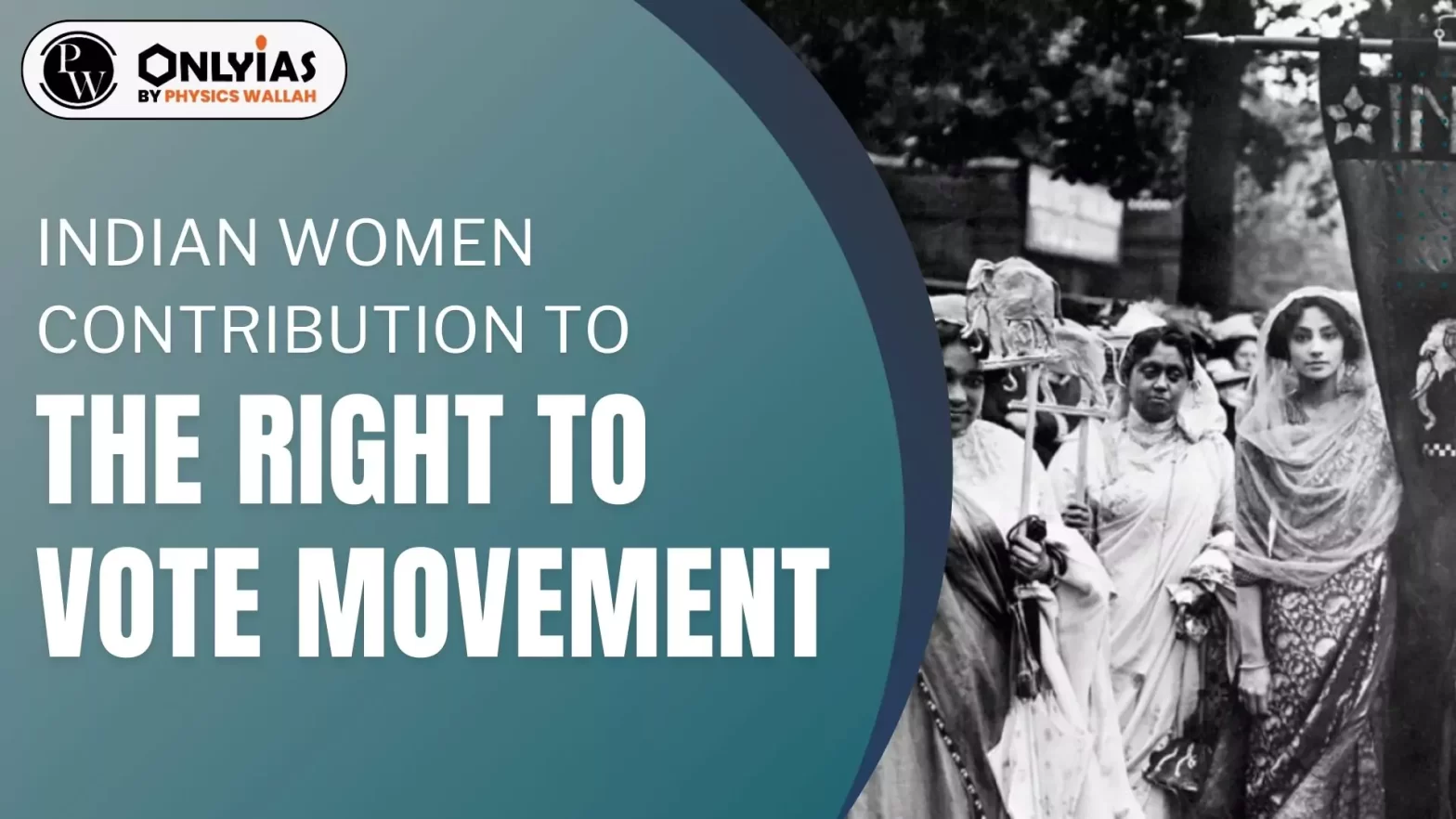Context:
This editorial is based on the news “75th Republic Day of India: The women who fought for our rights” which was published in the Indian Express. On 26th January 2024, India celebrated her 75th Republic Day, which showed a culture, diversity, military strength, women empowerment, and above all a show of ‘Viksit Bharat’ (developed India) and ‘Bharat – Loktantra ki Matruka,’ (India – mother of democracy) this diamond jubilee for India was led by the accomplished women of the nation.
Indian Women Contribution to the Right To Vote For Women in India
- Constitution, a Living Document: The Constitution was envisioned as a living document, allowing governments to mould the republic as per the contingencies of the time.
- Role of Feminist Movements: The feminist movements in pre-independent India played a crucial role in ensuring women’s rights were guaranteed in the Constitution.
- The Right to Vote: It is often claimed that women were “granted” this right at the same time as men. This is misleading and ignores the concerted efforts of women activists.
Efforts By Women for Right to Vote
- A Memorandum of Demands: In 1917, one of the first official calls for enfranchising women, when a delegation of women activists presented a memorandum of demands to Montagu and Lord Chelmsford, who had been tasked to formulate a scheme of self-governance for India.
- Formation of IWA: In 1917, the Women’s Indian Association (WIA) was formed to address the socio-economic challenges faced by women.
- It was the first national body to advocate for female suffrage.
- Travel for Support: In 1918, WIA and others travelled Britain to garner support for their causes.
- Action for Resolution: Sarojini Naidu took the women’s rights issue to the Congress party, moving resolutions for women’s enfranchisement at Congress sessions in Bijapur and Bombay.
- First Victory: The first victory came with the enactment of the Government of India Act, 1919 that allowed provincial legislatures to enfranchise women.
- First State to Grant the Right: In 1921, Madras became the first province to grant women the right to vote, followed by Bombay and the United Provinces.
- Massive Campaigns for Right in Bengal: The enfranchisement Bill was defeated in the Bengal Legislative Council. Suffragists led by the Bangiya Nari Samaj organised massive awareness campaigns for four years, leading to the passage of the Bill in 1925.
- Challenge for Women: The right to vote, while monumental, was conditional upon ownership of property, income, and other statuses which excluded a sizable number of women. Further, women still did not have a right to sit in legislative bodies.
Nehru Report & Beyond on Right to Vote
- Demand for Equal Civic Rights: The Nehru Report, a draft Constitution, prepared by an All Parties Conference in 1929 called for equal civic rights for all citizens.
- However, Britain was not keen on expanding this right.
- Travel for Support: To galvanise international support, a delegation led by Rajkumari Amrit Kaur and Shareefa Hamid Ali travelled to London, and then Geneva to petition the League of Nations.
- Achievement: The Government of India Act 1935 expanded the right to vote and paved the way for women in public offices.
- Several women contested the 1936-37 elections and joined provincial governments and women leaders created widespread acceptance for the idea of a universal adult franchise.
Extension of Activism Sphere by the Formation of the All India Women’s Conference (AIWC)
- Social and Personal Sphere: Womens’ activism extended to social and personal spheres.
- Formation: In 1927, several women-led organisations joined hands to form the AIWC.
- Emphasis On: Initially, AIWC focussed on women’s education. Later, it pushed for outlawing child marriage, raising the age of consent, and banning polygamy.
- Belief: AIWC believed that women’s emancipation was not possible without reforming the various religious laws (personal codes).
- Adoption of Indian Woman’s Charter of Rights and Duties: In 1945-46, the AIWC adopted this Charter, which demanded equality in all spheres.
- For Empowerment: It emphasised on women’s economic empowerment and highlighted the need to formally recognise the value of domestic work.
- Called for Wholesome Reforms: The charter advocated wholesale reforms to the personal codes, demanding the freedom to divorce, and equal property and inheritance rights. Some of these demands found their way into the Hindu Code Bill and were enacted a decade later.
On the Question of Seats Reservation on Religious Grounds
- In the aftermath of Partition, a key issue was the reservations of seats on religious grounds.
- Asked for Abolition: In the Constituent Assembly, Rajkumari Amrit Kaur and Begum Qudsia Aizaz Rasul made passionate appeals to do away with any special privileges.
- Eventually reservation was limited to the Scheduled Castes and Tribes.
- Fear of Communal Divisions: AIWC had been against separate electorates and believed that reservation deepened communal divisions, they even argued against women’s reservation.
- These issues caused a rift within the AIWC reflecting the diverse worldviews within the women’s movement.
Conclusion
In the last 70 years, feminists have strived to advance the rights of women leading to the enactment of various laws, policies, and Constitutional amendments but groundwork was laid by the women who came much before us. This 75th Republic Day is an opportune moment to honour and acknowledge their contributions.
Also Read: 75th Republic Day: Gallantry Award Winners List
![]() 27 Jan 2024
27 Jan 2024
